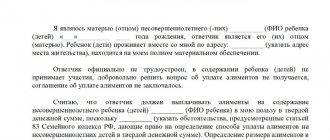Attention, this article is outdated!
Read about all the major changes in alimony legislation since 2019 in a new article on our website:
→ Alimony in 2019 ←
In 2021, alimony legislation has undergone a number of significant changes, which will come into full effect in 2018. Of course, the main aspects of alimony legislation remain unchanged (these are, first of all, the provisions established by the Family Code on the principles of assignment, methods of payment, initiation of enforcement proceedings and collection of alimony in 2021).
However, some aspects of family and executive legislation for the parties to alimony legal relations have nevertheless been improved, not only in favor of recipients of funds, but partly also in favor of their payers-debtors.
At the same time, many draft laws submitted for consideration to the State Duma did not receive the support of deputies , in particular. Among them are many “most anticipated” over the past few years:
- the law on the payment of alimony after 18 years of age if the child is studying (the last time it was proposed to increase the child’s “alimony” age for the period of his studies at college or university until he reaches 24 years of age);
- a draft law on approval of the alimony minimum (the minimum guaranteed amount of child support, which would be paid regardless of the financial situation of the second parent, including from the funds of the widely discussed state alimony fund);
- an innovation in terms of additional payments for a child - the so-called housing alimony - due to the wide public outcry, this initiative remains unapproved.
Consequently, in 2021, the above initiatives of public figures will not have the proper legal force.
Photo pixabay.com
New laws on alimony - changes for 2021, already in force
All current innovations in 2021 relate to resolving the most pressing issue - payment of alimony debt . The main bills that were approved are aimed at creating a special social payment for non-recipients of alimony, as well as expanding the scope of powers and responsibilities of bailiffs and employers of debtors.
In connection with the establishment of new values of the subsistence level (LM) and the minimum wage (minimum wage) in Russia in 2021, changes have occurred in determining the amount of alimony.
- According to the order of the Ministry of Labor of Russia dated June 25, 2018 No. 410n, the size of the monthly allowance for children for the 1st quarter of 2021 is 9959 rubles . The subsistence minimum is used when calculating child support if the father does not work or has an unstable income. Thus, the minimum child support in 2021 from a non-working person can be recovered in a fixed amount of money, a multiple of the minimum wage in the region of residence of the child.
- When sharing alimony withholding officially working parent, the claimant has the right to demand monthly alimony from the employer of at least 2,790 rubles.
11,163 rubles from May 1, 2021 (Article 1 of the Federal Law “On the minimum wage” dated June 19, 2000 No. 82-FZ).
Therefore, the minimum child support for 1 child in 2021 from a working father will be 11,163 / 4 = 2,790 rubles .
Payment of a survivor's pension instead of alimony
On March 7, 2021, Federal Law No. 48-FZ “On Amendments to Article 278 of the Civil Procedure Code of the Russian Federation and the Federal Law “On Enforcement Proceedings” came into force and began to be applied in practice.
The law provides for the possibility of the alimony collector, on the recommendation of the bailiff, to file a claim in court to declare the debtor missing if he has been on an unsuccessful enforcement search for at least 1 year. If the court recognizes the debtor as missing, the child is considered entitled to receive a survivor's pension from the Pension Fund of the Russian Federation instead of alimony.
To receive a survivor's pension instead of alimony, the claimant must meet a number of conditions :
- the presence of a court order or writ of execution for the assignment of alimony;
- initiation of enforcement proceedings in the department of the Federal Bailiff Service (UFSSP);
- presence of alimony debt (i.e. non-payment of alimony);
- putting the debtor on the enforcement wanted due to failure to establish his whereabouts and the presence of a resolution of the same name;
- lack of result of the ongoing investigative actions after the expiration of the one-year period for declaring the wanted list.
Based on the above circumstances, the bailiff, independently or at the initiative of the claimant, must explain to him the procedure for filing a statement of claim in the district court “On recognizing the debtor as a missing person.” The basis for a positive decision by the court will be the information presented by the bailiffs about the futility of the search actions , including the testimony of witnesses.
Acting to protect the rights of minors, the courts for the most part make positive decisions on these claims.
The court's decision to declare the debtor missing becomes the fundamental document for the Pension Fund when assigning a survivor's pension to a child instead of alimony from an absent parent.
Despite the fact that, in essence, the debtor’s alimony obligations become the obligations of the state, this procedure does not bring anything good to them: if a defaulter suddenly shows up, a lot of unpleasant consequences await him:
- firstly, state payments in the form of a survivor's pension will automatically become the defaulter's debt to the state ;
- secondly, when making a decision, the court sends it to many services and departments in order to invalidate certain documents of the debtor: passport, driver’s license, medical policy, and the person is also deregistered;
- thirdly, in order to restore his documents and civil rights, the defaulter will have to go to court to challenge the previous decision.
Indexation of alimony in a fixed amount of money by an organization
When alimony in favor of a child is collected in a fixed sum of money (TDS), it is provided for quarterly indexation in proportion to the increase in the cost of living for the child in the region of his residence (Article 117 of the Family Code (FC) of the Russian Federation).
Indexation is carried out so that alimony in the TDS corresponds to the constant increase in consumer prices for goods and services.
Previously, monitoring the indexation of alimony payments was the responsibility of bailiffs, who, due to their high workload and the huge number of enforcement proceedings, often missed out on this work. As a result, the fixed amount of alimony for a sufficient number of claimants did not change for years, which led to a violation of the rights of minors to normal maintenance from the obligated parent: prices rose, but alimony remained the same.
This problem was resolved on November 14, 2021 due to the entry into force of Federal Law No. 321-FZ.
According to this law, the obligation to index alimony began to lie not only on the bailiff, but also on the employer of the employed alimony payer, regardless of who submitted the writ of execution for execution to the payer’s workplace.
Legislators explained such an amendment to the Family Code by the fact that it will be much easier for employers to track the indexation of alimony, since they have many times fewer units of payers in a fixed amount than bailiffs have enforcement proceedings.
Example. For one enterprise N, with 3,000 employees, there is only one payer of alimony in the TDS, and the bailiff in charge of district N in the same city has over 400 enforcement proceedings for alimony in the TDS. Naturally, it is easier for an employer to track and correctly calculate the indexation of alimony for one employee than for a bailiff with 400 payers.
Expanding the powers of the bailiff in relation to the debtor
When the defaulter does not have official earnings, funds in bank accounts and property that can be foreclosed on, if there is a debt of more than 10,000 rubles. administrative measures can be applied to it.
The most stringent (besides criminal liability) for debtors in our country are the rules for applying Art. 5.35.1 of the Code of Administrative Offenses (CAO) of the Russian Federation, namely:
- compulsory work for up to 150 hours;
- administrative arrest for a period of 10 to 15 days;
- fine the debtor in the amount of 20 thousand rubles. if it is impossible to apply the two above measures.
However, even bringing to these types of liability requires the bailiff to comply with a number of conditions, one of which is repeated notification of the debtor about the possible application of measures under Art. 5.35.1 Code of Administrative Offenses and taking written explanations from him about the reason for the debt.
It turns out to be a vicious circle: debtors do not make contact with the bailiffs, do not appear to give explanations - and, therefore, it is not possible to bring them to justice. Contacting the internal affairs bodies to detain and deliver defaulters significantly slowed down and hampered the work of the FSSP employees.
At the end of October 2021, the problem was resolved: in Art. 27.2 and 27.3 of the Code of Administrative Offenses of the Russian Federation, changes were made that expanded the powers of bailiffs in terms of independently bringing and detaining debtors .
Now the mechanism for bringing to administrative responsibility has become significantly simpler and consists of the following sequence:
- Presence of alimony debt.
- Calling the debtor to the FSSP.
- Lack of response from the defaulter.
- Issuance of a decision on detention and arrest.
- Delivery to the Department of the Federal Bailiff Service.
- Taking explanations from the debtor by the bailiff.
- Making a decision on bringing to justice in case of non-payment of alimony debt.
Reducing the amount of penalties for late payment of alimony
On May 16, 2021, deputy of the Communist Party faction Tamara Pletneva reintroduced to the State Duma a bill to reduce the amount of the penalty collected by the court for late alimony payments. The essence of the bill was as follows:
- reduce the actual amount of the penalty from 0.5% to 0.1% per day of the total amount of overdue alimony debt;
- give the courts the authority to reduce the amount of the penalty, taking into account the financial and (or) family status of the alimony worker, if the amount collected is disproportionate to the payment.
The law is aimed at ensuring the principle of proportionality of the penalty, since its amount often reaches hundreds of thousands of rubles per debtor, which in reality becomes essentially an unaffordable amount to be paid by the alimony payer.
The initiative document successfully passed three readings of the State Duma, and on July 24, 2021 it was approved at a meeting of the Federation Council. The corresponding law was signed by the President of Russia V. Putin dated July 29, 2018 No. 224-FZ.
Average amount of alimony in Russia
To calculate the average salary, you need to know the average wages in Russia. Statistics when calculating the average income in Russia today gives a figure of 36,200 rubles. Based on this indicator, it is easy to calculate that the average alimony payments are equal to:
- For one minor – 25% of the FFP = 9,050 rubles.
- For two minors - 33.3% of the FFP = 12,054 rubles.
- For three or more – 50% of the FFP = 18,100 rubles.
The average salary in the Russian Federation 2021 for calculating alimony
When calculating average alimony payments, it is important to know the exact amount of average earnings in a particular region. Here are specific indicators for federal districts in rubles (data for the second half of 2021):
- Central Federal District - 43,780.
- Northwestern Federal District - 39,160.
- Volga Federal District – 25,080.
- Ural Federal District – 39,160.
- Siberian Federal District - 30,030.
- Far Eastern Federal District – 39,160.
Based on belonging to a specific federal district, we make a calculation. A resident of the Moscow region is guided by the figure of 43,780 rubles.
We calculate the maintenance paid by the father for one child:
43780 • 0.25 = 10945 rub.
The average amount of paid maintenance per minor is 10,945 rubles.
If the calculation is made for two minors, then:
43780 • 0,333 = 14579
This amount can be divided if the father pays it for children from two marriages. Amounts to 7289.5 rubles.
Having three or more minors, the average amount of benefit paid by the father will be equal to:
43780 • 0,5 = 21890
Depending on the number of children, this amount is divided into three, four, five or more parts.
Read further: Table of customs duties for 2021.
Changes in alimony legislation currently under consideration in 2021
The bills currently under consideration in the State Duma are positive not only for alimony collectors, but partly also for debtors. This provision relates to the protection of certain social guarantees for both parties to alimony proceedings. For example, it is proposed to prohibit the deduction of social guarantees paid to the debtor (other alimony for another child, compensation for harm to health, maternity capital, etc.) as alimony.
Below we discuss in detail which bills have been submitted for consideration to the State Duma in 2021 and at what stage of consideration they are at.
Creation of a special social bank account
Bill No. 221778-7 was introduced into the State Duma in the summer of 2017, but has currently only passed one reading. The essence of the bill is that social payments to individuals (funds for compensation for injury to health, survivor's pension, alimony for another child), which cannot be collected by bailiffs to eliminate alimony debt, will be deposited into a special social bank account .
Foreclosing on funds from such an account will be punishable by applying liability to an official in the amount of 50 thousand rubles. up to 1 million rubles
At present, bailiffs have the right to write off funds from all accounts of the debtor without exception, and, moreover, the law does not provide for the bailiff to find out the intended purpose of these funds. This entails in some cases the writing off of the debtor’s funds that are prohibited from collection, which subsequently results in a series of appeals by defaulters whose social rights are grossly violated.
The bill clarifies that other funds of debtors that are not related to social guarantees will not be able to be credited to a special bank account.
Will the state pay child support for non-payers in 2018?
On July 10, 2021, bill No. 507182-7 was introduced to the State Duma to amend Art. 112 RF IC. On July 12, 2021, the bill was sent to the State Duma Committee on Family, Women and Children for further consideration.
The main objective of the proposed bill is the payment of alimony by a government agency - social protection of the population - to those collectors who have not received alimony for more than 6 months , and the debtors do not have sufficient earnings and other income to pay off the debt.
In introducing such a proposal, legislators refer primarily to the protection of guarantees for minors and disabled family members recognized as persons in need of alimony.
Calculation of alimony within and outside of marriage
The Family Code clearly states that parents are obliged to raise and financially provide for their children, regardless of whether they are married or not. Any parent with whom the minor actually lives has the right to file a claim against the spouse in order to recover alimony.
In cases where the marriage union is dissolved or was not concluded at all, problems with the recognition of alimony payments do not arise. But you can apply for financial assistance from your current spouse only under certain circumstances:
- the parent avoids raising and providing for the child;
- spouses are engaged in separate households, which makes it difficult to verify the equality of the degree of participation of each party in the maintenance of the joint offspring;
- one of the parents distributes the family budget biasedly, thereby infringing on the rights of a minor child.
Important! Being in a civil marriage, the mother can count on financial assistance only if the paternity of a particular citizen is officially proven.
What hasn't changed in alimony legislation?
Some high-profile and widely discussed initiatives, which alimony collectors had been waiting for, were never approved by State Duma deputies, since, in their opinion, the legislation in this regard sufficiently complies with the guarantees of alimony recipients.
As a result , the following bills were rejected
- Alimony after 18 years - the project proposed the actual payment of funds when an adult is studying full-time at a school or university until graduation, but was rejected in favor of the existing legal norm - Art. 80 and Art. 120 of the RF IC establishes the termination of child support obligations when the child reaches the age of majority, regardless of the place and form of his studies.
- Payment of housing support - payments for certain housing guarantees of a child by a separate parent (for example, payment of a mortgage payment for the child’s share or partial payment of utilities or part of the payment for rented housing in which the child lives). As a result, such an initiative was rejected due to an alternative actually existing in the legislation - namely Art. 86 of the RF IC on the possibility of collecting additional expenses for a child, which can also be used to implement the housing rights of a minor.
- Creation of a special alimony fund - we are talking about a kind of financial “cushion” from which alimony could be paid to those claimants who do not receive monthly payments for a variety of reasons. However, if the above-mentioned bill No. 507182-7 on the payment of alimony by the state after six months of non-payment, the alimony fund can essentially become the funds of the social protection authorities, which will assume these financial obligations.
- Establishing a minimum alimony amount - the bill was once initiated by deputies of the LDPR party, proposing a minimum alimony threshold of 15 thousand rubles . This initiative has not been confirmed and currently there is no minimum or maximum amount of alimony. After all, the amount of alimony consists of a variety of factors: the method of collection, the social and marital status of the parties, the amount of income of the payer, etc.
What sources of income are taken into account?
Financial support for minors is withheld from most types of income of the payer. These include:
- all types of income from main and additional work;
- payments for vacation, sick leave, bonuses;
- all types of pensions;
- compensation;
- financial assistance and other types of income.
The list of income from which material support is not withheld is minimal:
- funds allocated for business trips;
- compensation for meals in the sanatorium and for the use of personal transport;
- financial assistance for funerals, weddings, birth of a child.
Deprivation of parental rights
As one of the sanctions measures against the debtor, the Law “On Child Support” proposes depriving parental rights according to a simplified scheme. First of all, you need to write a statement of claim to the judicial authority, and it is best to entrust this matter to a professional, so that he indicates in the paper all the important details related to the case, and the period during which the money for maintenance was not received.
In addition, you will have to prove that the defendant was hiding from the plaintiff and the bailiffs, changed his place of residence and took absolutely no part in the life of the joint child. To collect arguments, you can collect reviews from educational institutions, where their employees can confirm that the debtor never took away his son or daughter, and also did not participate in his educational activities.
Based on the available facts, the judge makes an appropriate decision regarding the deprivation of parental rights.
Collection from the debtor
Every year, the Government of the Russian Federation tightens the measures applied to alimony defaulters. However, the number of draft dodgers is changing extremely slowly.
Let us note the main amendments to Russian codes:
- Information about the presence of a debt is now distributed not only to train stations and airports, but also to traffic police officers. If the driver has a debt of more than 10,000, then his license may be confiscated.
- The amount of late fees has increased significantly - the debtor will have to pay an additional 0.5% of the debt amount every day.
- The bank accounts and property of the evader may be seized.
- For failure to pay alimony, the court has the right to sentence a person to forced labor for a year.
- Finally, the debtor may be deprived of parental rights under a simplified scheme.
Note! If the debt arose due to a coincidence of circumstances, and not as a result of malicious intent, then this will have to be proven in court.
Terms of payment
Since each of the parents, both father and mother, is legally obligated to support their child until he reaches adulthood, in the event of a divorce or one of the parties does not want to live with the other, there are grounds for collecting child support payments from her.
There are a number of cases when you can claim payment of compensation for child support, namely:
- Compensation payments are accrued only if the relationship is officially established or the payer has carried out the adoption procedure. Official establishment of paternity can be reflected in the birth certificate (column father), in accordance with a court decision to establish paternity, or in a document establishing paternity (issued by the territorial department of the registry office).
- Alimony can be paid by the second party when the first can prove that the potential payer is not fulfilling its obligations to the child regarding his maintenance (evading material support).
- Child support for 1 child in 2021 is calculated only until the child reaches the age of majority (or if there is a documented disability).
Payment procedure
How to collect alimony for maintenance?
The rules for paying child support are regulated either by an agreement, which is equivalent to a writ of execution, or by a court decision, and if the defendant refuses to voluntarily fulfill his obligations, bailiffs are involved in the case.
The payment procedure is as follows:
- Bailiffs can describe existing assets, which will encourage the debtor to find resources and pay off the debt.
- They may put things up for auction that can be sold, and after the sale, the money will be transferred to the plaintiff’s account.
- The plaintiff does not bear any costs to the bailiffs and all proceeds from the sale of the debtor's property will be paid to him.
Compensation from the state
Currently, the State Duma is considering a law on the payment of alimony directly by the state. Similar changes were proposed back in 2014, but only now there is a high probability that they will be implemented.
It is known that the minimum amount of alimony is the subsistence level and is a fixed value, which can only be changed by an appropriate court decision, and, in principle, the state itself can pay such a tax.
However, not all citizens should count on government assistance; it is provided only if the child support provider is wanted and is deliberately hiding from the bailiffs. The state will transfer alimony to the account of a minor child for the entire period while the search for the evader is underway.







